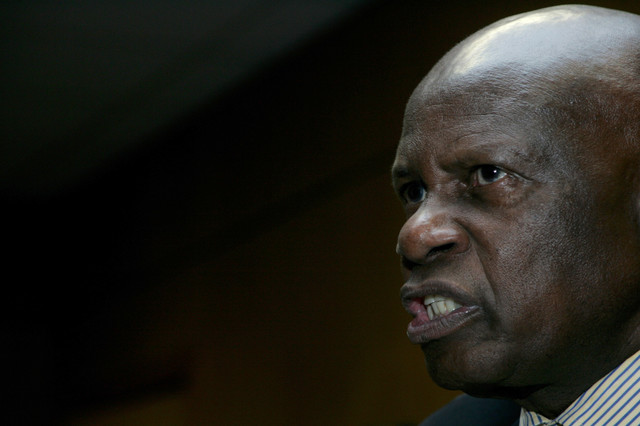The advice provided by the International Monetary Fund (IMF) to the Zimbabwean government to reduce the number of civil servants through retrenchment provides a tough policy choice for Finance minister Patrick Chinamasa. The IMF has previously given such advice to government with similar responses.
Chinamasa's position on this matter is guided by government and Zanu PF's position that retrenching civil servants is not in the best interest of workers, the economy and the government itself, including Zanu PF.
Retrenchment throws people into the street. In order to retrench civil servants, government has to compensate them. This would be an even more burdensome obligation considering the amounts of funds required as compensation.
Retrenchment will go against Zanu PF's election promise of guarding against job-losses. The government would actually rather be increasing them (jobs).
Government is the largest employer of Zimbabweans, currently with about 230 000 workers. The civil service salary bill currently stands at 70% of total government expenditure,
according to Chinamasa in his 2014 budget speech.
This leaves government with 30% to fund its core business of providing social services such as health, education, infrastructure and social services, among other expenses.
Clearly, this percentage is not adequate. An ideal public sector expenditure-structure should be inverse, with 30% of total expenditure going towards salaries, while 70% goes to the provision of public services.
It is tempting to view civil servants as a drain on the fiscus, yet they have sustained the economy through spending, savings and investing during the difficult economic times when the private sector was either scaling or closing down.
Chinamasa does not want to retrench civil servants, adding to the already high numbers of the unemployed. The retrenchment of civil servants has a multiplier effect as each worker has dependents, both immediate and extended.
However, the number of workers currently employed by government is not sustainable. The longer it takes to solve this problem, the more likely unintended consequences will happen. For instance, government might end up having to borrow even more to finance salaries, or reduce its role in providing public services because the bulk of its revenue goes towards paying civil servants' salaries.
In the latter case, that would mean government privatising the provision of public services or relying on non-governmental organisations.
A bloated civil service will prevent the uptake of technology to make processes fast and efficient.
If the civil service lags behind in technology, it will be difficult to work in sync with the private sector which it is tasked to regulate.
Government will not consider lowering the percentage of expenditure going towards salaries because they are already at rock bottom. Chinamasa and his Cabinet colleagues understand this dilemma, but hard choices have to be made.
He should resist the temptation to kick the can down the road so that the current government does not have to make the necessary tough decisions that will set in motion the reduction of employment costs.
It would be a political strategy that allows the country to be continuously bedeviled by high employment costs until it is solved by future generations. By that time, things might have deteriorated significantly.
Chinamasa suggested he would address the employment cost in the long term through growing the economy and improving the gross domestic product.
The likely assumption made by Chinamasa is that the current number of employees will remain static over time, so that expansion of the economy will justify the staff compliment.
A second assumption could be that government believes the rationalisation of employment levels will occur slowly over time through natural attrition such as retirement, resignations and deaths without corresponding hiring. The danger is that government loses on hiring new people with new ideas and fails to fill up critical positions.
Clearly, government will have to grow the economy in a robust manner to satisfy these assumptions; otherwise the high employment cost-structure will worsen the condition of public finances.
In order for government to do so successfully, it needs to establish a firm foundation now, upon which to build a viable economy.
That is why it is critically important that government deals ruthlessly with corruption so that resources are directed to their proper use, while sound
and ethical decisions are made by civil servants.
It is in the best interest of the civil service to build a viable economy, because it will allow a greater number to, not only be employed, but create sustainable opportunities for everyone around them.
Becoming efficient and a catalyst for economic growth will allow the civil servants to save their jobs in line with Chinamasa's long-term vision through growing the economy.
- newzimbabwe
 OK Zimbabwe posts US$17,8 million loss
OK Zimbabwe posts US$17,8 million loss  Hichilema meets Chivayo
Hichilema meets Chivayo  Millions celebrate Diwali festival in India
Millions celebrate Diwali festival in India  Econet Zimbabwe to delist from ZSE
Econet Zimbabwe to delist from ZSE  Gold edges up as traders await guidance
Gold edges up as traders await guidance  Mnangagwa fires Chitando, appoints Polite Kambamura
Mnangagwa fires Chitando, appoints Polite Kambamura  Young Investment Professional (YIP) Graduate Programme 2019
Young Investment Professional (YIP) Graduate Programme 2019 











 Young Investment Professional (YIP) Graduate Programme 2019
Young Investment Professional (YIP) Graduate Programme 2019
Editor's Pick